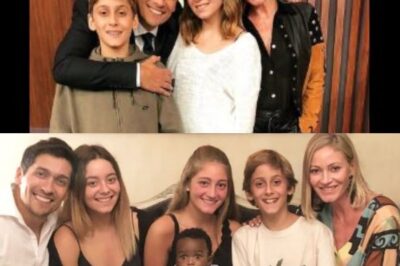In the small town of Valle de Bravo, nestled between the pine-covered mountains of central Mexico, the streets came alive in springtime with the bloom of the jacaranda trees. Their purple flowers rained onto the cobbled paths like soft confetti, coating the village in a dreamlike hue. It was under one of these trees, on a warm April afternoon, that a boy named Tomás discovered the photograph that would change his life forever.
Tomás was twelve, lanky and quiet, with eyes too curious for his age. He lived with his abuela, Doña Luz, a woman of few words but endless stories, who baked pan dulce in the early morning and sang lullabies in Náhuatl when she thought no one was listening. His parents had died in a car accident when he was just a baby, or so he’d been told. The details were always vague. A rainy night. A road outside Mexico City. A crash. That was all.
But Tomás always felt there was more.
That day, while helping clear out the old shed behind the church for the town’s upcoming Fiesta de la Primavera, he found the photograph. It was folded neatly inside an envelope, stuffed in the hollow base of a broken statue of the Virgin Mary. In the photo, a man stood beside a woman, smiling widely beneath a jacaranda tree. The woman looked hauntingly familiar — the same cheekbones, the same dimple on her left cheek. And in her arms, a baby with curly black hair and eyes like his.
He ran home, bursting into the kitchen where Doña Luz was kneading dough. “Abuela! Mira esto!” he cried, holding up the photo with shaking hands.
Her face went pale. For a long time, she said nothing. Then she wiped her hands on her apron, took the photo, and sat down heavily. “Pensé que lo había perdido para siempre,” she whispered.
“¿Quiénes son?” Tomás asked, though he already knew. Something inside him had already begun to stitch the truth together.
She told him the story as the pan dulce rose in the oven.
The woman in the photo was his mother, Isabella. The man beside her was not his father, but her love — Alejandro Serrano, a political journalist who had uncovered something he wasn’t supposed to. In 2013, Alejandro had exposed corruption linking a powerful governor to a drug cartel operating in Michoacán. Days later, he disappeared. The newspapers called it a robbery gone wrong. But Isabella knew better.
Fearing for her life and her unborn child, Isabella fled. She returned to Valle de Bravo, where she had grown up, seeking refuge with her mother — Doña Luz. But danger followed. One night, when Tomás was barely six months old, Isabella left him sleeping in his crib and walked into the woods, never to return.
“She thought she could draw them away,” Doña Luz said, tears running down her cheeks. “That if she was gone, you would be safe. I never told you because I wanted to protect you from the weight of it all.”
Tomás sat in silence, staring at the photograph. The truth was a river he hadn’t known he was swimming in — now rushing too fast to stop.
That night, he couldn’t sleep. The jacarandas whispered outside his window, and for the first time, their soft rustle felt like a call. At dawn, he packed a bag — not much, just a water bottle, the photograph, and his grandfather’s old compass — and set off toward the woods.
He didn’t know what he expected to find. A grave? A sign? A ghost?
The forest beyond Valle de Bravo was dense and sacred. Elders told stories of spirits that lived between the roots, of owls that carried messages, of trees that remembered everything. Tomás walked until the sun was high. Then he saw it — a small altar made of stones and candles, half-buried beneath a jacaranda. A string of white prayer flags fluttered in the wind. On one of them, scrawled in faded ink, was a single word: Perdón.
He sat before the altar and cried. Not the loud kind of crying, but the quiet, heavy kind that lives in the chest. He cried for a mother he never knew, for a truth buried by fear, and for the emptiness that had never made sense until now.
And then, a voice behind him.
“She sang to you every night,” it said.
Tomás turned around. An old man stood there, hunched and weathered, with eyes the color of storm clouds. He introduced himself as Esteban — a friend of Alejandro’s. He had lived in exile all these years, watching, waiting, guarding the trail for someone who might come looking.
They talked until sunset. Esteban confirmed everything. Isabella had been brave, defiant. She had loved fiercely and protected quietly. She had not wanted to disappear — but had done so out of love.
Before parting, Esteban gave Tomás a small, cloth-bound notebook. “Your mother’s words,” he said. “She wrote this in the days before she left.”
Tomás took the notebook home. That night, by candlelight, he read every page. Letters to him. Hopes. Fears. Memories of the day she first heard his heartbeat.
Each word was a thread, weaving her back into his life.
Years passed. Tomás grew. He finished school, then university. He studied journalism, like Alejandro. He wrote stories that mattered — about justice, memory, and truth. And every year, on the first day of spring, he returned to Valle de Bravo, where the jacarandas still bloomed.
He’d sit beneath their purple canopy with the old notebook, now worn and softened by time, and he’d read her words aloud. For her. For himself. For the silence that was finally filled.
And for every mother who had ever disappeared into the night to save the light of a child’s future.
News
Rafael Araneda presume cuanto han crecido sus hijos y deja boquiabiertos a todos
El hijo de Marcela Vacarezza y Rafael Araneda ha dejado a todos con la boca abierta. A través de redes…
Romance confirmado?… William Levy y Samadhi Zendejas vuelven a aparecer juntos… mira lo que hacen ahora.
La nueva aparición de William Levy y Samadhi Zendejas ha vuelto a encender una chispa de curiosidad que muchos creían…
Raúl de Molina arremete contra Eduardo Verastegui en defensa de todos los inmigrantes
La polémica volvió a encenderse en la televisión hispana luego de que Raúl de Molina, conductor de El Gordo y…
Univision anuncia limpieza con una intensa ola de despidos que se avecina
En las últimas horas, una noticia comenzó a circular con fuerza y a generar un clima de incertidumbre entre quienes…
EL ESCÁNDALO QUE DESTROZÓ MI EMBARAZO: A las 35 semanas, mi esposo me despertó a las 2 de la mañana con una “verdad” tan perversa que mi alegría de ser madre se convirtió en mi peor pesadilla y pedí el divorcio antes de que saliera el sol.
Con mi esposo Miguel, llevábamos tres años intentando tener un hijo. Probamos de todo: médicos, tratamientos, inyecciones, esperanzas rotas mes…
“El sorteo terminó, enfermera de clase baja” — El esposo la desalojó con sus gemelas pensando que no tenía nada, pero descubrió en el tribunal que ella era la dueña secreta de toda su deuda corporativa
Parte 1: El Desalojo Bajo la LluviaLa lluvia caía torrencialmente sobre la finca de los Thorne en Connecticut, pero el…
End of content
No more pages to load













